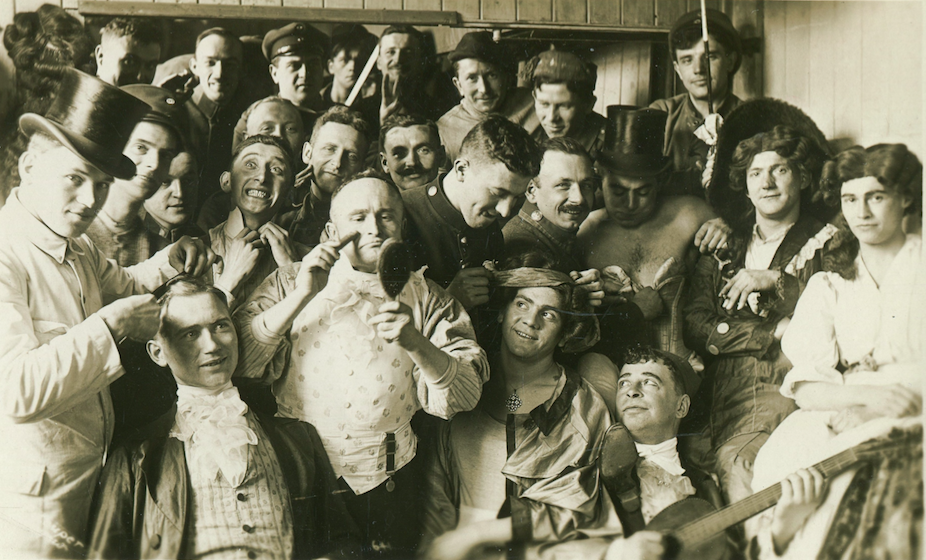Picture an expensively furnished dining room with a table set for over 30 people. Dr Felix Volkart and his wife Hermine will later host a lavish party; she is already in full evening dress. Their young maid is sent to roll the carpet out to the street. An elderly manservant, Baumann, is slowed by nostalgia, trying Hermine’s patience to the limit.
HERMINE: Go ask the cook whether the lobster has yet been brought; if not telephone.
BAUMANN: To whom? To the lobster?
HERMINE: No, to the delicatessen dealer. Number seven hundred and forty-six.
BAUMANN: It will all be attended to. Just to think, that 20 years have passed, and I still have the honour and the pleasure.
HERMINE (aside): He is incorrigible!
It’s the opening scene of Ludwig Fulda’s 1890 comedy Unter Vier Augen (By Ourselves), staged a century ago near Hawick in the Scottish borders. It was performed entirely in German as part of a lustspielabend, or comedy evening, of music and two plays – the other was Heinrich von Kleist’s Der Zerbrochne Krug (The Broken Jug, 1808).
The audience and actors needed this kind of distraction: they were in Scotland as prisoners of war. The show, which took place at the Stobs internment camp, was typical of those performed in British camps throughout World War I. They are a fascinating insight into a long-forgotten cultural history.
As part of the war centenary commemorations, a team from Edinburgh Napier University decided to recreate this evening. Now it is about to do a mini-tour.
Objects of suspicion
When war broke out, German citizens in Britain became objects of suspicion and surveillance. The Aliens Restriction Act was immediately passed, which allowed internment camps to be set up to prevent men aged 17 to 55 from serving in enemy armies. Prisoners of war were soon added, too.
Besides the Scottish borders, other locations for camps included Alexandra Palace in London, Dorchester and Southend in the south of England, and Douglas and Knockaloe on the Isle of Man. In all, according to research shortly to be published by colleagues on the Stobs project, Britain and its colonies interned 50,000 civilians and 90,000 military prisoners from Germany, Austria-Hungary and Turkey.
Theatrical nights were hugely popular. At Knockaloe, on the remote western side of the Isle of Man, detainees staged 113 comedies, 42 plays, 15 dramas, 21 variety shows and a pageant over a period of just six months. At Stobs, Carl Rössler’s comedy Die Fünf Frankfurter (The Five Frankfurters, 1911) was so popular it had to be performed seven times.


Stobs, which has lately been the focus of a major memorial project, held up to 4,500 detainees during wartime, though in 1916 the civilians all moved to Knockaloe. The war must have felt long in that windswept valley, and detainees had to keep themselves entertained – besides the drama club, there were musical instruments and a camp newspaper, Stobsiade. It was after hearing about that newspaper from my colleague Rachael Durkin that the idea to recreate a comedy evening came about.

Theatre shows in the camps helped guard against “barbed wire disease”, a dangerously depressive mixture of boredom and isolation. Performances would remind men about distant people and places, while popular German music provided powerful emotional cues.
Shows were dictated by practicalities – camps were men only, for example, so all women’s parts were performed by men in women’s clothing. The sexologist Magnus Hirschfeld later wrote that such acts helped normalise same-sex relationships in Germany and elsewhere.
The evening we decided to recreate, using just six actors in multiple roles, opens with a rendition of the bombastic overture to Jacques Offenbach’s Orpheus in the Underworld, famous for the later section best known as the can-can. The next item is By Ourselves, followed by the interval.
The musicians return with a stereotypically German Strauss waltz. Then comes The Broken Jug, a comedy about justice and the closeness of rural life. The truth of the title incident is slowly revealed by a series of farcical events.
We judged that recreating this evening in its entirety would have been too long and would have said nothing about the context of the camp. After all, our challenge was to bring the history of internment to life.
Our theatrical director, Iain Davie, decided to create a performance within a performance. He commissioned the scriptwriter Charity Trimm to write a comedic play set backstage on the night in question, drawing on historical sources for authenticity and incorporating parts of the night’s performance.

The characters in the backstage play include a college lecturer, a gymnast, a baker and a scientist. They’re acutely aware of life in other camps from letters from back home, down to the details of theatre props. The drama club is an ideal way to fill their time, until one actor injures himself and a more reluctant detainee has to step forward.
Played for laughs
The jaunty tone of these camp comedy evenings might seem strange to audiences today, but it shows how people cope under duress. Prisoners didn’t need reminded of their harsh reality, they wanted to focus on unavailable things such as privacy, intimacy, female companionship and fine foods.
We see something similar with British prisoners in German internment camps. The Ruehleben camp near Berlin also had a theatre club, where they performed everything from Shakespeare to light operas such as Gilbert and Sullivan’s The Mikado.

Indeed, entertainment and laughter have been getting humans through hardship for as long as we can remember. Examples include everything from the pastoral poetry that was a common response to the English Civil War of the 1600s, to glam rockers and new romantics in the lean years of the 1970s and early 1980s.
This reality adds poignancy to the lustspielabend of the internment camps. Elsewhere home fires burned and millions of soldiers wrote letters from the front. But in remote corners of the British countryside were lonely fearful men, clapping and laughing and hoping for better times.

